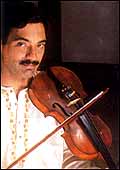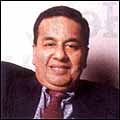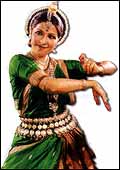













|
MANAGING
Double The Pleasure
Managing one career is tough enough, yet
an increasing tribe of executives is willing to manage two.
By Alokparna
Das
He looks a
bit-curly locks and all-like Walter Mathau's Einstein in the 1996
motion-pic IQ. The comparison sits lightly on the shoulders of Ranjit
Makkuni. He is, after all, a scientist, and not at some hole-in-the-wall
kind of research facility either: Makkuni works at Xerox PARC (Palo Alto
Research Centre for the uninitiated), and is a principal investigator of
the Active Learning Project-an initiative in the area of digital document
technology. It was in this capacity that he made a presentation in
mid-April to an enthralled audience in Delhi on everything from
intelligent documents to wearable computers.
 |
RANJIT
MAKKUNI
Ask him about issues like stamina, time and stress, and he grins.
His take: it is easy if you are motivated. |
He also looks a bit-again, curly locks and
all-like the Indian sitar maestro Ravi Shankar (just ignore the beard,
will you?). The reference to this resemblance too, isn't out of context.
Makkuni is an accomplished sitar player, a student of Ustad Ali Akbar Khan
(yes, we know Khan plays the Sarod, but Makkuni does train under him),
spends a couple of hours every day honing his skills on the stringed
instrument, and performs at two concerts a month. He has performed at San
Francisco and Paris, and a day after his hi-tech talk, he was at it at the
India Habitat Centre, a club in Delhi's Tony Lodhi Road neighbourhood.
Makkuni isn't a dilettante when it comes to
the sitar; he is a pro. And playing the sitar isn't a hobby for the man,
it's a vocation. Put simply, the PARC-scientist has another career, that
of a classical instrumentalist. Managing one career is hard enough, yet,
an increasing tribe of executives is willing to manage two. Ask Makkuni
about issues like stamina, time, and stress, and he grins. His take: it is
easy if you are motivated.
 |
P.K.
VIJAY KUMAR
"Onstage, there's nothing like a 90 per cent efficiency" |
Man about town, regular on the capital's
theatre circuit (on stage, not off it) and CEO of Equus Advertising, Suhel
Seth, has a few tales of his own to tell. Like how he zipped out of
Delhi's Kamani Auditorium seconds after a performance of Art, a play in
which he had the lead role, and arrived breathless at the launch of the
Daewoo Matiz, the advertising for which was being handled by Equus. ''The
campaign was a challenge, but I had to simultaneously devote time to Art,
which was equally important for me.''
But time is a cruel mistress, and most
people who aspire for excellence in two streams end up paying the price.
Madhumanti Sengupta's business card reads Vice-President, (Accounts
Management), Siemens Public Communications Network, but she doubles up as
an Odissi danseuse. Her days begin at 5.00 a.m with three hours of
practice and go on till 11.00 p.m at least. ''Aiming to achieve success in
two fields means rigorous schedules and hard work. But there's no stress
involved as I am doing something I really enjoy doing'', says Sengupta.
The catch? ''No socialising for me.'' There just isn't the time.
 |
PRADEEP
KUKREJA
" A vocation that makes you more visible than your competitor,
complements your professional growth" |
It is all very well for individuals to
nurture two careers, but how do organisations feel about their best and
brightest expending energy that could have been used otherwise on an
alternative career? Makkuni is all praise for the way Xerox has encouraged
his musical pursuits, but there are companies that like their employees to
be single-career individuals. ''Hiring such managers may not work for a
lean organisation like us,'' avers Arun Sehgal, the head of hr at
Gillette's Indian arm. ''A hobby is alright, but a full-fledged vocation
could impair a manager's productivity.''
That may be an extreme view: advocates of
the dual-career concept point to its obvious advantages, happier employees
and a positive rub off on the organisation. Then, they say, there is what
that extra career does to the individual itself. ''Broader perspective,''
stresses Suresh Sahu, General Manager (HR), Canon. ''Onstage, there is
nothing like a 90 per cent efficiency; it has to be 100 per cent,'' adds
P.K. Vijay Kumar, a violinist who also happens to be the chief executive
of NIIT's e-learning initiative, Netvarsity. ''Thus, it is necessary to
hone your skills to perfection and enhance your powers of concentration;
these are also the attributes of a good executive.'' Kumar, for those
particular about details, has performed about 1,000 concerts, some with
the legendary musician Dr. Balamuralikrishna.
 |
MADHUMANTI
SENGUPTA
This Odissi dancer and Siemens V-P clocks 16-hour days |
The recognition that comes with a career in
any of the performing arts doesn't hurt. ''A vocation that makes you more
visible than your competitor, complements professional growth,'' says
Pradeep Kukreja, Senior Consultant (Corporate Affairs), McDonalds India.
Kukreja is a familiar face on the idiot box, an advantage, he claims, when
it comes to interacting with people. That's right, an alternate career,
especially one like Kukreja's, makes for a great ice breaker, but it isn't
for everyone. Most executives prefer to let the 'other-career' die a
natural death, and, in the course of reporting, this correspondent did not
come across any marquee-name CEOs who boasted dual careers. But if you're
sure you'll never make it to the corner room, or are content with what
you've achieved, what the heck... pick up that double bass.
|

